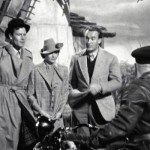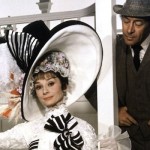Patton Review
There’s a four-star movie dying to get out of “Patton.†The first half of the film is some of the best stuff I’ve seen, and the central performance is larger-than-life, just like Patton himself. But the second half of the film gets bogged down in repetitive battles and character interaction. The film goes on for over three hours, and my attention was put to the test as things wind down. I’m still giving it a strong recommendation, however. Despite its flaws, it’s a damn fine piece of cinema.
General George S. Patton, Jr. (George C. Scott) was reportedly the only Allied officer that Hitler feared. His film makes this perfectly understandable. Patton was a wild man—a keen strategist, a risk-taker, a brutal leader, an unbelievably knowledgeable war historian, and a believer in reincarnation (in the film, he thinks he served in the Roman army and with Napoleon).
His rise to military fame begins in North Africa in 1943. The Americans get slaughtered in their first attempt to take on the Germans on this front. So Patton is brought in to whip this troop into shape. His methods are brutal—he doesn’t make many friends in his post—but he is successful. After taking North Africa, he decides to move into Sicily (like the Athenians did). He begins a fierce rivalry with his British counterpart, Montgomery (Michael Bates), and he loses even his closest ally, General Omar Bradley (Karl Malden). But his battlefield accomplishments are still unparalleled. He takes Sicily sooner than anyone expects. However, an incident during which he slaps a frightened soldier forces his superiors to take action against him.
The rest is history. The press turns against him. He loses his post. Bradley brings him back, and he marches through Europe. Unsurprisingly, Patton’s downfall is more interesting and entertaining than his comeback. Here, we see a man who is better than anyone else at what he does get shoved aside because he isn’t humane enough. Yet, we also get a glimpse at the humanity inside of him. It’s a fascinating juxtaposition of a wonderfully fleshed-out character. Plus, the battles themselves are spectacularly filmed. Director Franklin J. Schaffner isn’t usually regarded as one of the all-time greats, but what he does here is magical.
By the time Patton is given a second chance, however, we’ve been hammered over the head with the idea that he is a pain in the neck, that his mouth will get him into more trouble than any battle. And the battle scenes themselves, while still impressive, don’t improve upon anything we hadn’t seen in the first half of the film. Things would have been much tighter, and much more enjoyable, had they fast-forwarded through the march across Europe stuff. It’s all a case of been there, done that. And in a movie as long as this, even the slightest extemporaneous scene will cause you to glance at your watch.
Still, all of this seems moot when you have a performance as epic as Scott’s. His character is a legend of both the history books and—after this—the silver screen. Patton is as three-dimensional a character as any. One minute, he’ll make you pity him; the next, he’ll make you mad as hell. Words just don’t do it justice. It needs to be seen to be believed.
Scott dominates the screen in such a way that no other actor in the film makes an impact. The character with the most screen time (besides Patton, obviously) is Bradley. Karl Malden was a tremendous actor, but his character just stays in shadows the whole time. It’s not bad work by any means, but not something Malden will be remembered by.
“Patton†is the kind of film that the Oscars go wild for. It took home eight awards in 1971, including Best Picture, Director, and Actor. It stands out within the historical biopic genre, but in a decade full of exceptional Best Picture winners, like The French Connection, The Godfather, and The Deer Hunter, it’s a slight letdown. It’s just too damn long. Had Schaffner called it quits a bit earlier, or had the editing been a bit tighter, this could have been an all-time great.
















